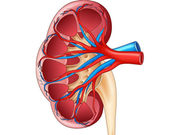Long-term estradiol treatment induced renal and cardiac hypertrophy, reduced glomerular filtration
MONDAY, Dec. 12, 2016 (HealthDay News) — For midlife ovariectomized Long Evans rats, long-term estradiol (E2) treatment exerts detrimental effects on kidney health, despite lowering blood pressure, while short-term E2 lowers blood pressure and reduces renal damage, according to an experimental study published online Nov. 9 in American Journal of Physiology-Renal Physiology.
Margaret A. Zimmerman, Ph.D., from Tulane University in New Orleans, and colleagues ovariectomized female Long Evans retired breeders at age 11 months and randomized them into three groups: 80 days vehicle (Veh>Veh), 40 days E2 + 40 days vehicle (E2>Veh), and 80 days E2 (E2>E2).
The researchers found that the E2>Veh and E2>E2 groups had lower systolic blood pressure and enhanced mesenteric relaxation in response to estrogen receptor α stimulation compared with Veh>Veh. E2>E2 induced renal and cardiac hypertrophy, reduced glomerular filtration, and increased proteinuria in spite of reduced blood pressure. Significantly fewer tubular casts were seen in kidneys from E2>Veh rats than in the other groups.
“These findings highlight that the duration of hormone therapy may be an important factor for renal health in aging postmenopausal women,” the authors write.
Full Text (subscription or payment may be required)
Copyright © 2016 HealthDay. All rights reserved.








